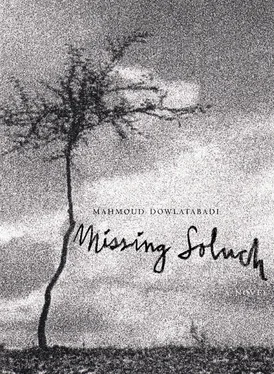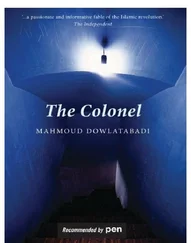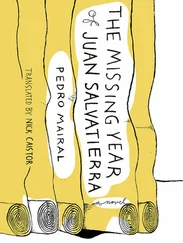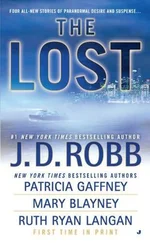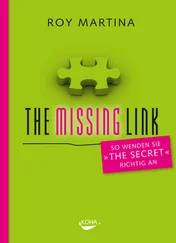Abrau had come to raise the issue of his pay for his previous day’s work. His worries now came from the fact that, after having awoken at dawn to come down to the water-boiler room, Ali Genav was clearly so self-involved that Abrau didn’t have the heart to ask him for anything, much less for his money.
“And now my donkey has come down sick, too! The hairs on his body are all on end, and the poor thing is shaking like a leaf. What did you do to him yesterday?”
“A donkey that’s put to work doesn’t become sick, does it?! You must have let it get cold last night!”
Ali Genav replied, “No! He must have been sweating, and you must have had him stand somewhere for a while in the wind, and he caught a cold.”
Abrau took a handful of kindling and pushed it into the fireplace with the poker. “We went straight there and came right back. And I’ve ended up sicker than your donkey!”
Ali Genav smoked the last bit of his cigarette and sighed, “I don’t know what to do with this woman! She’s become the greatest burden of my life.”
Abrau carefully said, “Ali …”
Ali Genav looked at him. The pupils of his eyes shone in the light from the fire.
Abrau asked, “Do men who leave ever return?”
Ali Genav stared at the smoke rising from the fire, took the poker from Abrau, and said, “What do you know about the ways of the world? He might eventually come back. Some do. Your father could return one day.”
Abrau said, “And do they all leave in this way?”
Ali said, “No, each one leaves in his own way.”
Abrau said, “I just wish I knew where he’d gone. Why didn’t he tell us where he was going?”
Ali said, “Do you think he knew where he was going himself? Some have left and have never been heard from again; while others send word after some ten or fifteen years. Morad Nim Mani left and we didn’t hear from him for eighteen years, when we found out that he was in Bejnurd working as a prayer scribe. But once Muhammad Balachai left, it was as if he’d never existed! And we heard the news of the death of another fellow just recently — his children went up toward Sangsar to take his sheep, and they ended up staying out there. And then there’s Ghuli, the father of our own Safdar … He left like a real bastard. He had three camels and worked as a porter on the road to Ghuchan. Out there, he did business among the Kurds, and the women there attracted his attention. Some say he’d fallen in love. He used to play the dohul drum and he was a good dancer. Anytime the Kurds had a wedding, he’d show up. Eventually, he sold his camels and wasted away what little he had. Then one day he came back to Zaminej with his hands empty, begging. I remember it well. I had just shaved for the first time and I was going with some others to play kolah qidj when I saw that Ghuli Khan had shown up. His camel’s saddle was on his back. Those days, if you were a camel owner, you could marry well. He had a fiancée here, Safdar’s mother, who was then still really just a girl. He went to his fiancée’s home and was acting the role of the husband-to-be. That night, he had his way with her. He planted the seed of our own Safdar that very night. Then next day, he sold the inheritance he had from his father — a copper cup and saucer set and some bits — to Karbalai Doshanbeh, the father of Salar Abdullah. He bought some rice with the money and made a rice dish and ate it with his fiancée. The next morning he left and no one would ever see him again. No one knows what hell he’s gone to! Some say he’s gone back to those same parts, around Darreh Gaz, that is, where the Kurds are. Some say Safdar knows about this. But any time talk of his father comes up, Safdar shakes his head and says, ‘He can go to hell!’ One time, I jokingly said to him, ‘Go find your father; they say he’s been seen up by Darreh Gaz.’ He replied, ‘I hope he goes even farther away, to Kalleh Khavajeh or farther!’ And you’ve heard the story about my own uncle, no?”
Abrau said, “I just wish I knew where he’d gone!”
Ali Genav said, “Forget about it — if wanting to see him was like a tooth, I’d say you should pull it out and throw it away. Imagine he was never here. What do we know? Goats go where there’s grass, don’t they?”
Abrau replied, “I just wish I could forget about him!”
Ali Genav said, “Between you and me, your father had no choice. He was a respectable man. We need to give him his due; he had a strong sense of honor. He was hard-working. He was creative. He wouldn’t let anyone speak down to him. He had a short temper. He just couldn’t take much more. That’s why he left! Soluch was entirely different from Safdar’s father. I know that if Soluch is ever able to fill his pockets with something, he’ll be sure not to forget you. He’ll be sure to show up then. He was a reliable sort, Soluch. The poor guy!”
Abrau was stoking the fire. He said nothing. He was sitting on his legs before the fireplace, lost in thought. His lips were pressed together. It seemed as if he were unconscious of Ali Genav’s presence. Ali Genav also decided to drop the subject. He was tired and sleepy. He yawned, punched his chest with his fist, and said while rising, “I’m going to go lie down and see if I can sleep. You keep an eye on the fire. The pots are already boiling, so take it easy with the kindling. Just take care the fire doesn’t go out.”
Abrau was silent. Ali Genav went to a corner of the room, lay down on an old blanket, and said, “Put the kettle by the edge of the fire so that it’ll boil. I have so much to do today! I have to dig my own mother’s grave, God rest her soul. That other poor woman — I don’t know what to do about her. But if I can’t get some sleep, I’ll be useless.”
Abrau put the handle of the kettle on the end of the poker and set it on the edge of the fire.
“You’re like me. We have the same nature. You’re good with any kind of work. But this Abbas, he takes after his worthless uncle! He’s split right down the middle. Instead of focusing his mind on any particular work, his eyes are always looking around for something else. He’s always trying to get at what someone else is holding or carrying. His eyes are like hungry thieves. He’s like a dog that thinks someone will eventually come around to throw him a bone. His mind and eyes are always searching, like a stray dog. In a few days, he’ll have a beard and mustache — I can’t help but wonder how he’ll fill the belly of a wife and children then?”
Soluch had told Abrau many times, “The only time a man can raise his head among people is when his shoulders have been drenched in sweat. A man is someone who, if you slap him on the back, dust rises from his shirt!”
On the rare occasions when Soluch spoke, he would generally speak in this vein. He’d say things like, “Work! Work! The bread you get from work is what gives you your essence, your honor. A man only has his work!”
But why did he leave all of a sudden?
There was no way that Abrau could digest this. However he looked at it, he couldn’t comprehend it. He knew that need was at the heart of it. Could there be anything else? Yes, need — but so what? Was Soluch the only one who was in need? Only him? How could he be justified in leaving? Just leaving like that. Leaving behind his wife and daughter. One might consider the others, Abrau and Abbas, as nearly men. But what about Hajer? Didn’t he consider the fact that by next spring Hajer would be nearly at the age of maturity? That she’d be stepping onto the ladder of adolescence? Had he even thought about these things? He must have. The Soluch that Abrau knew was a responsible man. He was practical, more bones than muscle. He couldn’t have gone without thinking over all of these questions. But where could he have gone? After all, winter’s not the season for working. If you had a special skill that used the different fingers of your hand, during the winter you’d never have to open your fist. To the extent that Abrau’s experiences in life had taught him something about these things, he knew that no matter where they went to find work, all the men would return to their homes in the winter. There, they’d huddle under one roof with the rest of their families to wait out the season until spring. They’d make it through the winter in one way or another, surviving with very little. So where could Soluch have gone in the middle of the winter? What kind of work could have drawn him away?
Читать дальше
